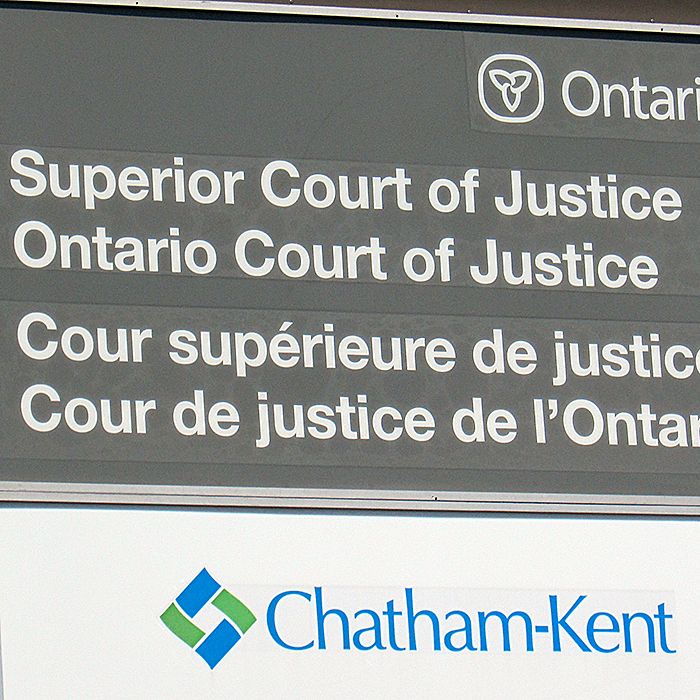A convicted killer appeared in superior court in Chatham today hoping for a chance at applying for early parole.
Wearing a black, long-sleeve Under Armour shirt, blue jeans and sporting a freshly shaved head, Mason Jenkins was escorted to the prisoner box by three Chatham-Kent police officers as his lawyer prepared to make a declaration of constitutional invalidity.
LEADWAVE Technologies from Chatham Voice on Vimeo.
Defense lawyer Howard Krongold said he hopes the faint hope clause, which gave offenders the ability to apply for early parole, can still be applied to his client.
The 36-year-old Jenkins is serving a life sentence for the first-degree murder of his younger sister, Jennifer Jenkins in 1998. She was shot three times in the head and twice in the chest.
Krongold said the faint hope clause should still apply to Jenkins, as it was in effect at the time of the crime and conviction.
“Faint hope is a part of the punishment,” Krongold said. “Ten years of parole ineligibility is a significant punishment.”
The clause was phased out after a change in legislation back in 2011.
Krongold said the changes have caused offenders that may have had a “reasonable prospect” or “substantial likelihood” to plead their case for early parole to a jury.
He said currently the legislation allows offenders to file a request to a judge.
Krongold said statistics show that about 80% of faint hope applicants were successful in getting a hearing from 1988 to 2012. Of the 149 successful applicants, he said 138 of them, or about 93%, ended up receiving early parole in that time frame.
The human element with the jury is significant, he added.
Crown attorney Rob MacDonald said the right to apply for early parole under the faint hope clause was not part of punishment.
“There is no right to early parole,” MacDonald said.
He added he believes the change in legislation had multiple objectives, including protection of the victims’ families, truth in sentencing, societal objectives and protection of the public.
“It’s not about the protection of innocence or the right to a fair trial, or the right to silence,” MacDonald said. “It’s simply the right to apply. Nothing has changed.”
Both Krongold and MacDonald said the changed legislation has created a higher threshold for the applicants and makes the process more stringent.
Superior Court Justice Renee Pomerance said she is going to reserve her decision on the legislation.
“I will work as diligently as I can to have the decision rendered at the earliest opportunity,” she said.
Outside the courtroom, Krongold said he believes this is the first case in Ontario that the faint hope legislation has been challenged since the changes in 2011.
No return date was set for this case.








I'd be worried about his parents safety and his other family. If he can kill his sister and admit in life his plan to kill his parents. WTF guess society doesn't protect people anymore.
Right! And his emotionless demeanor was chilly! He is capable of anything..The irony is that he most likely will out live his mother and get everything which is what he wanted in the first place.
I just watched that show and I agree he was cold, besides he slowly killed his father. He should do fully his time ,I would not trust him .
I was chilled to the bone how cold and unfeeling he was to his parents. I would watch my back around him for sure.
I love my child but I would love from afar
Mason Jenkns doesn’t deserve any freedom period. He murdered his sister in cold blood and should not be given parole.. He can’t be trusted..The city of Chatham Ontario doesn’t want him back in this city.. He is a dangerous man his father died because of all the stress from what Mason did.. It was very hard for him..his parents lived a life sentence of their own after Mason killed his sister…He should never be given parole.